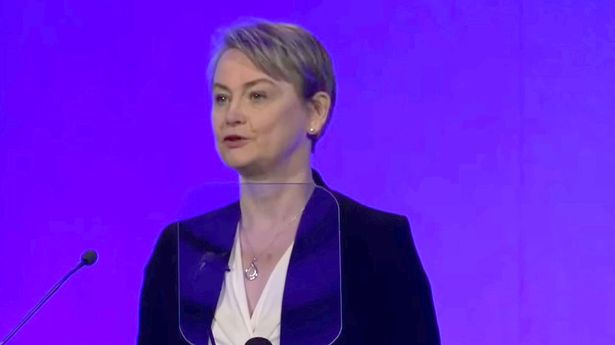Yvette Cooper said she was "shocked" how little was being done to prevent knife crime before Labour came to power.
The Home Secretary also told police chiefs that outdated technology means officers are using 50-year-old computer systems to catch criminals. In a scathing verdict on- Tory failure, she said too many politicians had been standing "on the sidelines shouting at police when things go wrong" - but not giving them the support they need.
Ms Cooper announced the Government will be ploughing an extra £500million in a sweeping wave of reform. She said ageing tech and the impact of austerity is "holding policing back", telling police chiefs: "I mean the Police National Computer is now 50 years old. It was cutting edge when I was five." The Labour frontbencher said the Tories had failed to listen to warnings about the impact cuts had on law and order.
The new funding package will help set up a new national centre of policing, which the Home Office says will "harness new technology and forensics". A new performance unit will also be set up to "end the postcode lottery" on law and order.
Ms Cooper told the conference, hosted by the National Police Chiefs' Council and Association of Police and Crime Commissioners: "Too often the Government just walked away or made the job harder.
"Too many politicians – including predecessors in my department – have stood on the sidelines shouting at the police when things have gone wrong instead of rolling up their sleeves and working in partnership withthe police to tackle these challenges head on.
Be the first with news from Mirror Politics
US ELECTION WHATSAPP: Join our US Election WhatsApp group here to be first to get all the biggest news and results as America heads to the polls. We also treat our community members to special offers, promotions, and adverts from us and our partners. If you don’t like our community, you can check out any time you like. If you’re curious, you can read our Privacy Notice.
POLITICS WHATSAPP: Be first to get the biggest bombshells and breaking news by joining our Politics WhatsApp group here. We also treat our community members to special offers, promotions, and adverts from us and our partners. If you don’t like our community, you can check out any time you like. If you’re curious, you can read our Privacy Notice.
NEWSLETTER: Or sign up here to the Mirror's Politics newsletter for all the best exclusives and opinions straight to your inbox.
PODCAST: And listen to our exciting new political podcast The Division Bell, hosted by Mirror interim political editor Lizzy Buchan and Express political editor Sam Lister, every Thursday.
"The result is that at present, our police officers cannot do the job they signed up for in the way they want to, and cannot deliver for the public as they should."
She said that many chief constables had tried to warn the previous Government about the impact of cuts, but been ignored. She said: "Many of you warned over a decade ago of the damage that austerity was doing to neighbourhood policing.
"Ministers said you were ‘crying wolf’. Now we know who was right. Even after the previous government reversed the reduction in the overall number of officers, policing has not returned to our streets."
She said the Government would use some of the additional funding to deliver its promise to put 13,000 more neighbourhood officers and PCSOs back on the UK's streets. And Ms Cooper vowed to step up work to prevent crime, saying: "I was shocked to discover on arrival at the Home Office how little the department itself had been doing on prevention.
"That has to change. Already we are driving new action from curbing knife sales to tackling mobile phone theft, but we need to go much further both locally andnationally, for the mission to be met."
Gavin Stephens, chairman of the National Police Chiefs' Council, said there are too many decision makers in the current structure of 43 forces in England and Wales - making it harder to get things done. He told delegates at the policing summit: "The world around us has changed beyond recognition yet we remain rooted in a system designed in the early 1960s, before mobile phones, the internet, even the M25 which came along two decades later."
